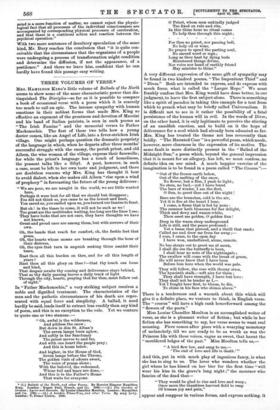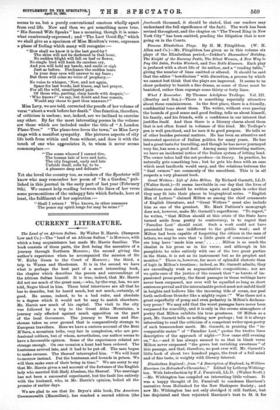THREE VOLUMES OF VERSE.*
Mug. HAMILTON KING's little volume of Ballads of the North seems to show some of the same characteristic power that dis- tinguished The Disciples—so far as it is possible to compare a book of occasional verse with a poem which it is scarcely too much to call an epic. The intense sympathy with human emotions in their noblest forms that made Mrs. King so effective an exponent of the greatness and devotion of Mazzini and his band of Italian patriots, is seen in such poems as "The Irish Famine" and the memorial verses to Father Mackonochie. The first of these two tells how a young doctor comes, like an Angel of Life, into a fever-stricken Irish village. One might perhaps question the dramatic propriety of the language in which, when he departs after three months' successful struggle with the enemy, the parish priest, and old Aileen, the wise woman of the village, express their farewells; for while the priest's language has a touch of homeliness, the peasant talks like a Sibyl. A poet, however, in such a case, must be left to her own taste and judgment, and there are doubtless reasons why Mrs. King has thought it best to avoid dialect, when she makes old Aileen "rise upon a wind of prophecy" in forecasting the future of the young deliverer : "We are poor, we are naught in the world, we are little wanted
here, Perhaps it were best for all that we should but disappear; You did not think so, you came to us the lowest and least, You saved us, you smiled upon us, you turned our famine to feast.
But oh! in the times to come, it will not be such as we !
Too great are the multitudes waiting, too long are the lines I see; They have looks that are not ours, they have thoughts we have not known, Great and proud ones are among them, but with sorrows of their own.
Oh, the hands that reach for comfort, oh, the feeble feet that press, Oh, the hearts whose moans are breaking through the hour of their distress, Oh, the eyes that turn in anguish seeking thine amidst their tears, Hest thou all this burden on thee, and for all this length of years ? Mast thou all this glory on thee F—that thy touch can loose and bind, That despair awaits thy coming and deliverance stays behind, That as thy daily passing leaves a daily track of light Through the city, hearts, praying God for thee, must follow out of sight."
In "Father Mazkonochie," a very striking subject receives a noble and dignified treatment. The characteristics of the man and the pathetic circumstances of his death are repre- sented with equal force and simplicity. A ballad, it need hardly be said, lends itself to extract less readily than any kind of poem, and this is no exception to the rule. Yet we venture to quote one or two stanzas:—
" Oh, awful is the wilderness,
And pitiless the snow ; But down in dim St. Alban's The seven lamps burn aglow, And softly in the Sanctuary The priest moves to and fro, And with one heart the people pray ; And this is home below.
And higher, in the House of God, Seven lamps before the Throne, The golden vials of odours sweet, The voice of praise alone ; With the beloved, the redeemed, Whose toil and tears are done,— And this is in the Father's Home That waits for everyone.
• (1.) Ballads of the North, and other Poems. By Harriet Eleanor Hamilton King. London: Regan Paul, Trench, and Co. 1889.-12.1 The Garden of Dreams: Lyrics and Sonnets. By Louise Chandler Moulton. London : Macmillan and Co. 1%0.—(3.) A London Plano-Tree, and other Verse. By Amy Levy. Louden.; T. Fisher TIrmin. 1899. 0 Priest, whom men unkindly judged Too fixed on rule and rite,
In this thine hour no ritual comes To help thee through this night; For thee no priest, nor passing bell, No holy oil or wine, No prayer to speed the parting soul, No sacred word or sign ; Long as thou haat by dying beds Ministered things divine, Nor voice nor hand of earthly friend May minister to thine."
A very different expression of the same gift of sympathy may be found in two kindred poems, "The Impenitent Thief" and "Dives." Both are intended to express, and do express with much force, what is called the "Larger Hope." We must frankly confess that Mrs. King would have done better, in our judgment, to leave the first subject alone. There is something like a spirit of paradox in taking this example for a text from which to preach what may be briefly called Universalism. It is difficult not to see in it rather the possibility of a fatal persistence of the human will in evil. In the words of Diver, on the other hand, it is only legitimate to perceive the stirring of an unselfish emotion, and to build on it the hope of deliverance for a soul which had already been educated so far. Mrs. King has treated the theme not less reverently than boldly. "The Haunted Czar " is a powerful poem, which needs, however, more clearness in the expression of its motive. The same fault is more distinctly present in the "Ballad of the Midnight Sun," a poem which, beyond the general impression that it is meant for an allegory, has left, we must confess, no definite idea on our mind. A much happier exercise of the imagination is to be found in a poem called "The Crocus ":—
" Out of the frozen earth below,
Out of the melting of the snow, No flower, but a film, I push to light; No stem, no bud,—yet I have burst The bars of winter, I am the first, 0 Sun, to greet thee out of the night !
Bare are the branches, cold is the air, Yet it is fire at the heart I bear, I come, a flame that is fed by none : The summer hath blossoms for Her delight, Thick and dewy and waxen-white, Thou seest me golden, 0 golden Sun !
Deep in the warm sleep underground Life is still, and the peace profound : Yet a beam that pierced, and a thrill that smot3 Called me and drew me from far away ;— I rose, I came, to the open day I have won, unsheltered, alone, remote.
No bee strays out to greet me at morn, I shall die ere the butterfly is born, I shall hear no note of the nightingale ; The swallow will come with the break of green, He will never know that I have been Before him here when the world was pale.
They will follow, the rose with thorny stem, The hyacinth stalk,—soft airs for them ;
They shall have strength, I have but love: They shall not be tender as I,—
Yet I fought here first, to bloom, to die, To shine in his face who shines above."
There is a tenderness and a warmth about this which will give it a definite place, we venture to think, in English verse. The " crocus " will have a high rank henceforward among the "flowers of the poets."
Miss Louise Chandler Moulton is an accomplished writer of verse, as she is a pleasant writer of fiction; but while in her fiction she has something to say, her verse seems to want real meaning. Piece comes after piece with a wearying monotony of melancholy, till we are ready to be as wroth as was the Princess Ida with these voices, vague as sweet, that haunt the "mouldered ledges of the past." Miss Moulton tells us,—
" A bird flew low, and sang to me,—
' The end of love and life is death."
And this, put in with much play of ingenious fancy, is what she has to sing to us. The lover who wonders whether the girl whom he has kissed on her bier for the first time "will wear his kiss in the grave's long night ;" the mourner who fancies of the dead that-
" They would be glad to rise and love and weep ; Once more the thankless harvest field to reap Of human joy and pain," appear and reappear in various forms, and express nothing, it
seems to us, but a purely conventional emotion wholly apart from real life. Now and then we get something more true.
"His Second Wife Speaks" has a meaning, though it is some- what cumbrously expressed ; and "The Last Good-By," which we shall give as a specimen of Miss Moulton's verse, expresses a phase of feeling which many will recognise :—
" How shall we know it is the last good-by ?
The skies will not be darkened in that hour, No sudden blight will fall on leaf or flower, No single bird will hush its careless cry,
And you will hold my hands, and smile or sigh Just as before. Perchance the sudden tears In your dear eyes will answer to my fears ; But there will come no voice of prophecy,—
No voice to whisper, Now, and not again, Space for last words, last kisses, and last prayer, For all the wild, unmitigated pain Of those who, parting, clasp hands with despair,'—
' Who knows ?' we say, but doubt and fear remain, Would any choose to part thus unaware ?"
Miss Levy, we are told, corrected the proofs of her volume of verse "about a week before her death." One function, therefore, of criticism is useless; nor, indeed, are we inclined to exercise any other. By far the most interesting poems in the volume are those which are included under the title of "A London Plane-Tree." "The plane-tree loves the town," as Miss Levy sings with a manifest sympathy. She pictures aspects of city life both from within and from without, and does it with the touch of one who awreciates it, to whom it never seems commonplace :—
"The scene whereof I cannot tire, The human tale of love and hate, The city fragrant, early and late Unfolds itself, rolls by, to be A pleasure deep and delicate."
Yet she loved the country too, as readers of the Spectator will know who may remember her poem of "In a Garden," pub- lished in this journal in the early part of last year (February 9th). We cannot help reading between the lines of her verse some premonitions of the unhappy fate which forbade, here at least, the fulfilment of her aspiration :— "Shall I return ? Who knows, in other summers The peace my spirit longs for may be mine ? "



















































 Previous page
Previous page